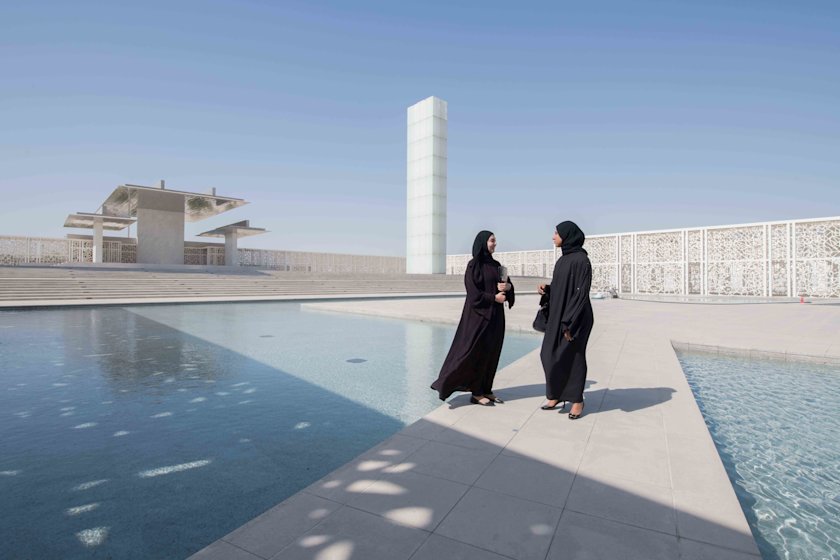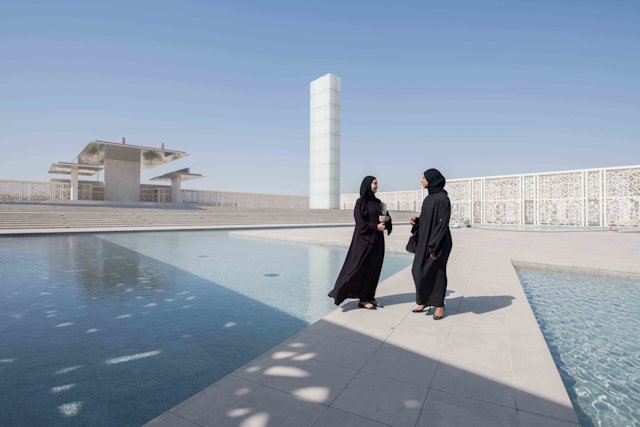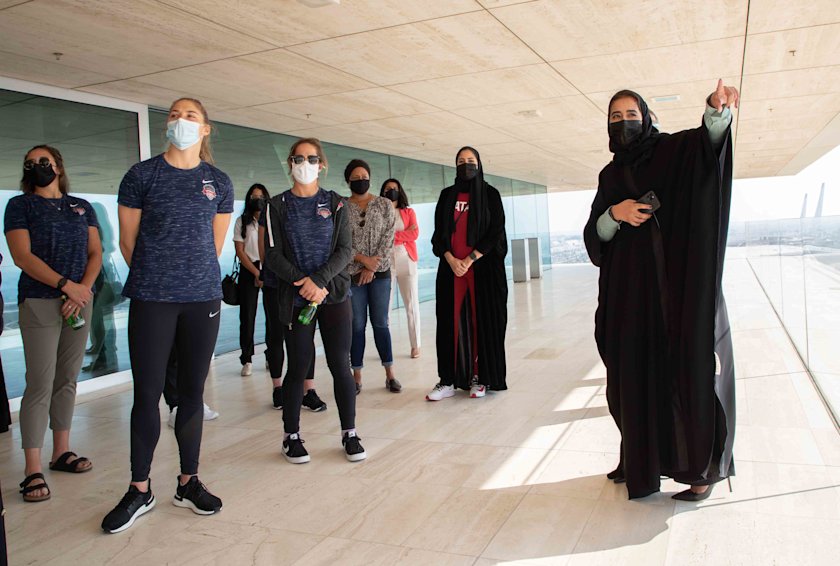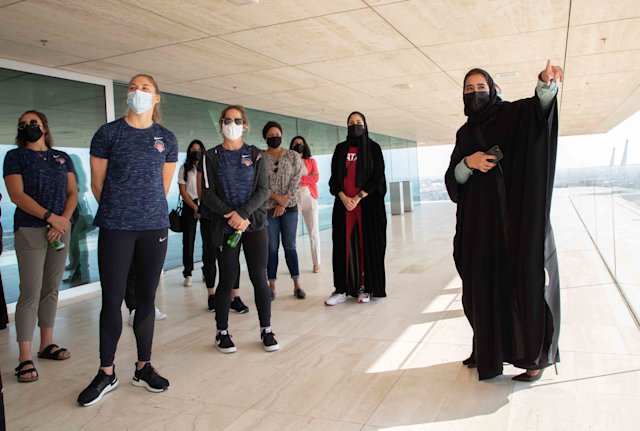A Culture Of Strength, Unity… And Pride
2020 was a year in which people throughout Qatar – in common with those across the world – found their resilience tested in a way they could never have imagined 12 months previously.
But as it drew to a close, the spirit of Qatar National Day assumed added resonance, encouraging the community of the nation to look back at the tests they had to overcome and the changes they needed to make to their lives, and reflect with pride on their strength and fortitude.
For Qatar Foundation (QF), this pride came from playing its part in ensuring learning, innovation, and dialogue never ceased, even in times of challenge that came with no precedent, and in contributing to the wellbeing, resilience, and continued advancement of Qatar and its people.
And December represented an opportunity for QF – and all of Qatar – to recognize and celebrate the strength, purpose, unity, and empowerment that flows from identity; the enduring value of cultural heritage; and the beauty and vitality of the Arabic language.
2020 was a year in which people throughout Qatar – in common with those across the world – found their resilience tested in a way they could never have imagined 12 months previously.
But as it drew to a close, the spirit of Qatar National Day assumed added resonance, encouraging the community of the nation to look back at the tests they had to overcome and the changes they needed to make to their lives, and reflect with pride on their strength and fortitude.
For Qatar Foundation (QF), this pride came from playing its part in ensuring learning, innovation, and dialogue never ceased, even in times of challenge that came with no precedent, and in contributing to the wellbeing, resilience, and continued advancement of Qatar and its people.
And December represented an opportunity for QF – and all of Qatar – to recognize and celebrate the strength, purpose, unity, and empowerment that flows from identity; the enduring value of cultural heritage; and the beauty and vitality of the Arabic language.
Cultural identity and heritage provide certainty and purpose even in trying times. As 2020 ended, QF – and Qatar – reflected on how these cornerstones of life inspire a resilient, positive response to the challenges the world poses, and build a platform to view – and shape – the future.


The core of society
These themes were brought together as QF launched the Education City Speaker Series Bel Arabi – an Arabic-only strand of its growing global platform for dialogue – by welcoming His Excellency Salah bin Ghanem Al Ali, Minister of Culture and Sports.
In a virtual talk titled Youth and Identity: Responding to Challenges that reflected QF’s role in preserving and promoting the Arabic language, heritage, culture, and knowledge, His Excellency discussed how young people can follow their goals and dreams, and drive positive change within their communities, while retaining their sense of identity.
Defining “human dignity” as being foremost among the values on which Qatar was founded, His Excellency described culture as being “the core of any society”, and said: “The responsibility of preserving our deeper identity is held by both the individual and the wider community.
“A community or society cannot be distinguished without the individual, and an individual cannot be distinguished without belonging to a community.”
These themes were brought together as QF launched the Education City Speaker Series Bel Arabi – an Arabic-only strand of its growing global platform for dialogue – by welcoming His Excellency Salah bin Ghanem Al Ali, Minister of Culture and Sports.
In a virtual talk titled Youth and Identity: Responding to Challenges that reflected QF’s role in preserving and promoting the Arabic language, heritage, culture, and knowledge, His Excellency discussed how young people can follow their goals and dreams, and drive positive change within their communities, while retaining their sense of identity.
Defining “human dignity” as being foremost among the values on which Qatar was founded, His Excellency described culture as being “the core of any society”, and said: “The responsibility of preserving our deeper identity is held by both the individual and the wider community.
“A community or society cannot be distinguished without the individual, and an individual cannot be distinguished without belonging to a community.”
A community or society cannot be distinguished without the individual, and an individual cannot be distinguished without belonging to a community
أشار سعادة صلاح بن غانم العلي خلال الجلسة النقاشية التي نظمتها مؤسسة قطر إلى سُبل تحقيق تطلعات الشباب وطموحاتهم انطلاقًا من الهوية، وكيفية تمكين الشباب لإحداث التأثير الإيجابي الذي يسعون إلى تحقيقه في مجتمعاتهم، واستكشاف ماهية التحديات التي قد تواجههم في عالمنا اليوم@QF pic.twitter.com/uABMSVO41z
— وزارة الثقافة و الرياضة (@MCSQA) December 16, 2020
Learning from each other
New cross-cultural connections were formed as QF welcomed a top American women’s football team to Education City, ahead of the launch of the 2021 U.S.-Qatar Year of Culture.
Players from Washington Spirit enjoyed a week of cultural experiences and sporting activities in Doha, reflecting the close ties and history of partnership and friendship between Qatar and the US. Their visit helped to mark the kick-off of the latest edition of a Qatar Museums cultural exchange program that builds and strengthens bonds, promotes understanding between Qatar and other nations, and invites people to explore cultural similarities and differences.
While at QF, the team met and coached students from Qatar Academy Doha – one of the schools under QF’s Pre-University Education – and QF’s girls’ football team. And Washington Spirit goalkeeper Aubrey Bledsoe captured the spirit of the visit by saying: “It’s incredibly important to build bridges between countries.
“We all have so much to learn from each other, and I think you see how Qatar Foundation really values this.”
New cross-cultural connections were formed as QF welcomed a top American women’s football team to Education City, ahead of the launch of the 2021 U.S.-Qatar Year of Culture.
Players from Washington Spirit enjoyed a week of cultural experiences and sporting activities in Doha, reflecting the close ties and history of partnership and friendship between Qatar and the US. Their visit helped to mark the kick-off of the latest edition of a Qatar Museums cultural exchange program that builds and strengthens bonds, promotes understanding between Qatar and other nations, and invites people to explore cultural similarities and differences.
While at QF, the team met and coached students from Qatar Academy Doha – one of the schools under QF’s Pre-University Education – and QF’s girls’ football team. And Washington Spirit goalkeeper Aubrey Bledsoe captured the spirit of the visit by saying: “It’s incredibly important to build bridges between countries.
“We all have so much to learn from each other, and I think you see how Qatar Foundation really values this.”
It’s incredibly important to build bridges between countries. We all have so much to learn from each other
This is an incredible experience. Thanks for having us! @WashSpirit @USAmbQatar https://t.co/HSXeFWd3Ma
— Paige Nielsen (@Paigenielsen) December 15, 2020


More than a game
Just as culture can unite people, so can sport, and its capacity to build bridges between nations and generations – as well as to tackle global issues – was emphasized at Qatar’s second Generation Amazing youth festival.
Hosted by the Supreme Committee for Delivery & Legacy with QF as a strategic partner, the virtuaj event gathered young people from Qatar, the region, and around the world in a showcase of football’s capacity to empower, unify, and help improve societies.
The festival saw QF highlight its commitment to providing inclusive sporting opportunities through its Ability Friendly programs in swimming, football, and cricket, with Machaille Hassan Al-Naimi, President of Community Development, QF, saying: “Sport instills incredible behaviors and values that cut across different sectors in our lives.
“When children look at sports teams and see people of different nationalities, and different walks of life, focusing on one shared goal, it shows them that there is something greater than the individual themselves, and that they can all come together.”
Just as culture can unite people, so can sport, and its capacity to build bridges between nations and generations – as well as to tackle global issues – was emphasized at Qatar’s second Generation Amazing youth festival.
Hosted by the Supreme Committee for Delivery & Legacy with QF as a strategic partner, the virtuaj event gathered young people from Qatar, the region, and around the world in a showcase of football’s capacity to empower, unify, and help improve societies.
The festival saw QF highlight its commitment to providing inclusive sporting opportunities through its Ability Friendly programs in swimming, football, and cricket, with Machaille Hassan Al-Naimi, President of Community Development, QF, saying: “Sport instills incredible behaviors and values that cut across different sectors in our lives.
“When children look at sports teams and see people of different nationalities, and different walks of life, focusing on one shared goal, it shows them that there is something greater than the individual themselves, and that they can all come together.”
Sport instills incredible behaviors and values that cut across different sectors in our lives
QF runs Ability Friendly Programs in:
- Swimming
- Football
- Cricket
Changing the face of healthcare
In the world of research, QF’s Sidra Medicine revealed how its researchers are using small organisms called zebrafish, which share 70 percent of their genes with humans, to make connections between genetic variations and the diseases they cause – advancing medical understanding, and potentially supporting treatment decisions for human patients.
December also saw Sidra Medicine hold its virtual Precision Medicine and Functional Genomics Symposium, focusing on the use of targeted solutions to elevate patient care and tackle pandemics; and perform its first pediatric kidney transplant from a deceased donor.
“This is a pediatric first for Qatar and a game-changer for children, many of whom are unsuccessful in finding living kidney donors,” said Dr. Pippi Salle, Sidra Medicine’s Division Chief of Urology.
And the ethical component of animal research conducted by Sidra Medicine and QF member Hamad Bin Khalifa University (HBKU) began being overseen by QF’s Equine Veterinary Medical Center, to ensure that the search for new knowledge also meets the highest ethical standards.
In the world of research, QF’s Sidra Medicine revealed how its researchers are using small organisms called zebrafish, which share 70 percent of their genes with humans, to make connections between genetic variations and the diseases they cause – advancing medical understanding, and potentially supporting treatment decisions for human patients.
December also saw Sidra Medicine hold its virtual Precision Medicine and Functional Genomics Symposium, focusing on the use of targeted solutions to elevate patient care and tackle pandemics; and perform its first pediatric kidney transplant from a deceased donor.
“This is a pediatric first for Qatar and a game-changer for children, many of whom are unsuccessful in finding living kidney donors,” said Dr. Pippi Salle, Sidra Medicine’s Division Chief of Urology.
And the ethical component of animal research conducted by Sidra Medicine and QF member Hamad Bin Khalifa University (HBKU) began being overseen by QF’s Equine Veterinary Medical Center, to ensure that the search for new knowledge also meets the highest ethical standards.
This is a pediatric first for Qatar and a game-changer for children
250+ scientists, researchers, and medical professionals participated in Sidra Medicine’s Precision Medicine and Functional Genomics Symposium
Winning recognition
Across QF, the final month of the year was one of individual accolades – including for a scientist at HBKU’s Qatar Computing Research Institute.
Dr. Xiaosong Ma became the first woman, and only the sixth person overall, to be named an Association for Computing Machinery (ACM) Distinguished Fellow while working in the Arab region, due to her work on technologies that advance computing.
Meanwhile, a new book on climate change by Dr. Anatol Lieven, a professor of government at Georgetown University in Qatar – a QF partner university – was selected as a Financial Times Book of the Year, in the environment category. It sees Dr. Lieven argue that only drastic measures that appeal to people’s patriotism can prevent environmental disaster.
And a group of students at QF partner university Northwestern University in Qatar claimed third place in an international digital marketing contest organized by Purdue University in the US – having competed against 85 teams from around the world – for a campaign that promoted a student loan repayment app.
Across QF, the final month of the year was one of individual accolades – including for a scientist at HBKU’s Qatar Computing Research Institute.
Dr. Xiaosong Ma became the first woman, and only the sixth person overall, to be named an Association for Computing Machinery (ACM) Distinguished Fellow while working in the Arab region, due to her work on technologies that advance computing.
Meanwhile, a new book on climate change by Dr. Anatol Lieven, a professor of government at Georgetown University in Qatar – a QF partner university – was selected as a Financial Times Book of the Year, in the environment category. It sees Dr. Lieven argue that only drastic measures that appeal to people’s patriotism can prevent environmental disaster.
And a group of students at QF partner university Northwestern University in Qatar claimed third place in an international digital marketing contest organized by Purdue University in the US – having competed against 85 teams from around the world – for a campaign that promoted a student loan repayment app.
Northwestern University in Qatar was ranked 3rd out of 85 teams in an international digital marketing competition
Leading the way
Demonstrating how female scientists in Qatar are making their mark on a global level, a Weill Cornell Medicine-Qatar researcher was recognized internationally in December.
Dr. Isra Marei, a post-doctoral associate in pharmacology at the QF partner university, was one of three winners in the Post-Doctorate Researchers Category in the L’Oréal-UNESCO for Women in Science Middle East Regional Young Talents Program, for her work on 3D vascular drug screening platforms – saying the award would “keep me working as hard as I can to make valuable contributions to scientific discovery”.
And fellow QF partner university HEC Paris in Qatar marked its 10th anniversary in the region by launching a series of scholarships for its executive education programs – including one focused on supporting female future leaders.
“The Women In Leadership scholarship seeks to encourage the development of women with the potential to make a significant impact in economic, social, or political spheres,” explained Dr. Pablo Martin de Holan, Dean of HEC Paris in Qatar.
Demonstrating how female scientists in Qatar are making their mark on a global level, a Weill Cornell Medicine-Qatar researcher was recognized internationally in December.
Dr. Isra Marei, a post-doctoral associate in pharmacology at the QF partner university, was one of three winners in the Post-Doctorate Researchers Category in the L’Oréal-UNESCO for Women in Science Middle East Regional Young Talents Program, for her work on 3D vascular drug screening platforms – saying the award would “keep me working as hard as I can to make valuable contributions to scientific discovery”.
And fellow QF partner university HEC Paris in Qatar marked its 10th anniversary in the region by launching a series of scholarships for its executive education programs – including one focused on supporting female future leaders.
“The Women In Leadership scholarship seeks to encourage the development of women with the potential to make a significant impact in economic, social, or political spheres,” explained Dr. Pablo Martin de Holan, Dean of HEC Paris in Qatar.
HEC Paris in Qatar has 829 alumni, 114 of whom graduated in 2019/20
How data opens doors
Joining researchers from Canada, Lebanon, and other countries, a team from HBKU’s College of Health and Life Sciences took part in a major project aimed at using data to identify opportunities for repurposing drugs to treat COVID-19 patients.
The computational analysis carried out by the team provides the largest set of pre-clinical candidate drugs and US Food and Drug Administration-approved drugs – all known to be safe – that could be explored as COVID-19 treatments.
And researchers at HBKU’s College of Science and Engineering developed an innovative Artificial Intelligence-based model designed to improve the performance of professional footballers. Having studied 864 Qatar Stars League matches, the team analyzed how players performed through sophisticated mathematical models - revealing strategies for winning.
“Such data-driven AI-based research will allow us to learn from the past and create a better plan for the future, aligning Qatar as a global pioneer in innovation and football technology,” said Ahmed Khellil Abbassi, Executive Director of Competitions and Football Development at Qatar Stars League.
Joining researchers from Canada, Lebanon, and other countries, a team from HBKU’s College of Health and Life Sciences took part in a major project aimed at using data to identify opportunities for repurposing drugs to treat COVID-19 patients.
The computational analysis carried out by the team provides the largest set of pre-clinical candidate drugs and US Food and Drug Administration-approved drugs – all known to be safe – that could be explored as COVID-19 treatments.
And researchers at HBKU’s College of Science and Engineering developed an innovative Artificial Intelligence-based model designed to improve the performance of professional footballers. Having studied 864 Qatar Stars League matches, the team analyzed how players performed through sophisticated mathematical models - revealing strategies for winning.
“Such data-driven AI-based research will allow us to learn from the past and create a better plan for the future, aligning Qatar as a global pioneer in innovation and football technology,” said Ahmed Khellil Abbassi, Executive Director of Competitions and Football Development at Qatar Stars League.
Data-driven AI-based research will allow us to learn from the past and create a better plan for the future
HBKU’s College of Health and Life Sciences has 134 students and offers 5 graduate programs
Finding the balance
In a year that created fresh work-family balance challenges for families, QF’s Doha International Family Institute (DIFI) gathered local and regional experts to study how this blend can be found in Qatari and Omani society.
DIFI studies on the difficulties faced by working parents – particularly working mothers – and their impact on family life, as well as how laws and legislation could be updated to reflect changing regional work-family dynamics, were explored, with Dr. Sharifa Al-Emadi, Executive Director of DIFI, saying: “The studies focused on what working parents in the region may suffer from, due to a lack of policies that coordinate work and family.”
For high school students considering their career paths, a new avenue of support was provided as QF’s Qatar Career Development Center (QCDC) and Qatar Science & Technology Park launched Meshkat – a pilot program raising awareness of what the field of technology innovation and entrepreneurship offers.
“The initiative will encourage high school students to embark on their digital entrepreneurship journeys,” said Abdulla Al Mansoori, Executive Director, QCDC, “and transform their innovative ideas into successful projects.”
In a year that created fresh work-family balance challenges for families, QF’s Doha International Family Institute (DIFI) gathered local and regional experts to study how this blend can be found in Qatari and Omani society.
DIFI studies on the difficulties faced by working parents – particularly working mothers – and their impact on family life, as well as how laws and legislation could be updated to reflect changing regional work-family dynamics, were explored, with Dr. Sharifa Al-Emadi, Executive Director of DIFI, saying: “The studies focused on what working parents in the region may suffer from, due to a lack of policies that coordinate work and family.”
For high school students considering their career paths, a new avenue of support was provided as QF’s Qatar Career Development Center (QCDC) and Qatar Science & Technology Park launched Meshkat – a pilot program raising awareness of what the field of technology innovation and entrepreneurship offers.
“The initiative will encourage high school students to embark on their digital entrepreneurship journeys,” said Abdulla Al Mansoori, Executive Director, QCDC, “and transform their innovative ideas into successful projects.”
The initiative will encourage high school students to embark on their digital entrepreneurship journeys
QCDC’s work is focused on:
- Instilling career-driven mindsets
- Raising career awareness
- Supporting career policies, planning, and practices
- Providing career guidance tools
A mission in a picture
One single picture encapsulates everything that has driven QF’s mission for the past 25 years.
Unveiled on Qatar National Day, and marking a milestone year in QF’s story, It depicts Her Highness Sheikha Moza bint Nasser, Co-Founder and Chairperson of Qatar Foundation, and Her Excellency Sheikha Hind bint Hamad Al Thani, Vice Chairperson and CEO of Qatar Foundation, with thousands of students from the organization’s schools and universities.
It reflects how QF’s unique ecosystem brings together children and young people from Qatar and throughout the world to learn, explore, discover, create, innovate, and thrive, as they are empowered to become lifelong learners and change-makers, and take their place among a new generation of leaders. And it illustrates a commitment.
A commitment to investing in the young people who are the future of Qatar, and the world.
A commitment that QF made 25 years ago.
And a commitment that QF will always stand by, as it supports the sustainable development of Qatar, creates new knowledge capable of benefiting the world – and unlocks human potential.
One single picture encapsulates everything that has driven QF’s mission for the past 25 years.
Unveiled on Qatar National Day, and marking a milestone year in QF’s story, It depicts Her Highness Sheikha Moza bint Nasser, Co-Founder and Chairperson of Qatar Foundation, and Her Excellency Sheikha Hind bint Hamad Al Thani, Vice Chairperson and CEO of Qatar Foundation, with thousands of students from the organization’s schools and universities.
It reflects how QF’s unique ecosystem brings together children and young people from Qatar and throughout the world to learn, explore, discover, create, innovate, and thrive, as they are empowered to become lifelong learners and change-makers, and take their place among a new generation of leaders. And it illustrates a commitment.
A commitment to investing in the young people who are the future of Qatar, and the world.
A commitment that QF made 25 years ago.
And a commitment that QF will always stand by, as it supports the sustainable development of Qatar, creates new knowledge capable of benefiting the world – and unlocks human potential.


